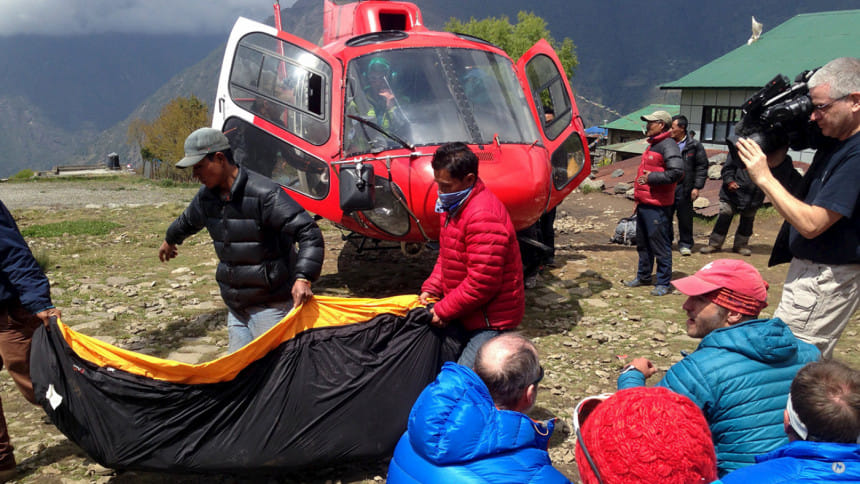Nepal earthquake: Mount Everest climbs 'almost impossible'

Climbing Mount Everest this season is "almost impossible" because the routes have been damaged by avalanches triggered by last month's earthquake, officials in Nepal say.
They warn that it will take time for the routes to be remade. The government has not announced an official decision.
At least 19 people were killed in the avalanches.
The 7.8-magnitude earthquake is now known to have killed more than 7,000 people and injured more than 10,000.
The window for reaching the summit of Everest closes at the end of May because of the start of the monsoon, and some climbers are already waiting at Base Camp in the hope of the route re-opening soon.
Most climbers have paid $70,000 (£46,200) for the expedition.
Amid continuing uncertainty however, all except one or two of the 42 expedition groups have already called off their ascent bids, officials say.
Officials of the Sagarmatha Pollution Control Committee (SPCC) told the BBC that "icefall doctors" - who are expert rope and ladder-fixing Sherpas - decided that further climbs were impossible this spring after inspecting avalanche-hit areas of the mountain.
Most climbing firms have lost either lost their members or suffered a huge loss of equipment.
Almost a year ago another avalanche at the world's highest peak claimed the lives of 16 Sherpa guides.
The government appears to be leaving the decision about scaling Everest to individual climbers - 357 were registered for this climbing season.
"The government will not officially announce the closure because we have given the permit to climbers," Tulsi Prasad Gautam of the tourism department told Reuters news agency.
Gautam said on Monday that small tremors were still being felt on Everest.
The government says much of the rescue work after the quake is over, and the remaining operations can be handled mostly by local teams.
But it says that it will require huge international support for reconstruction and rehabilitation.
More than 4,000 aid workers from around the world have been helping with relief and rescue operations
Analysis: Richard Galpin, BBC News, Kathmandu
At the moment the Nepalese government is refusing to officially announce that there will be no more climbing on Everest this year.
It knows it would be an unprecedented move because it would be the second year in a row.
And that could have implications for the country's vital tourism industry of which mountaineering and trekking are major parts.
Those climbers who had wanted to continue their Everest expeditions will be frustrated, while many of the teams will want their permits carried over to next year, which will mean a loss of revenue for the government.
A senior official had also told the BBC earlier that they wanted to normalise the situation in the country as quickly as possible after the earthquake to minimise the damage to the tourism industry.

 For all latest news, follow The Daily Star's Google News channel.
For all latest news, follow The Daily Star's Google News channel. 



Comments